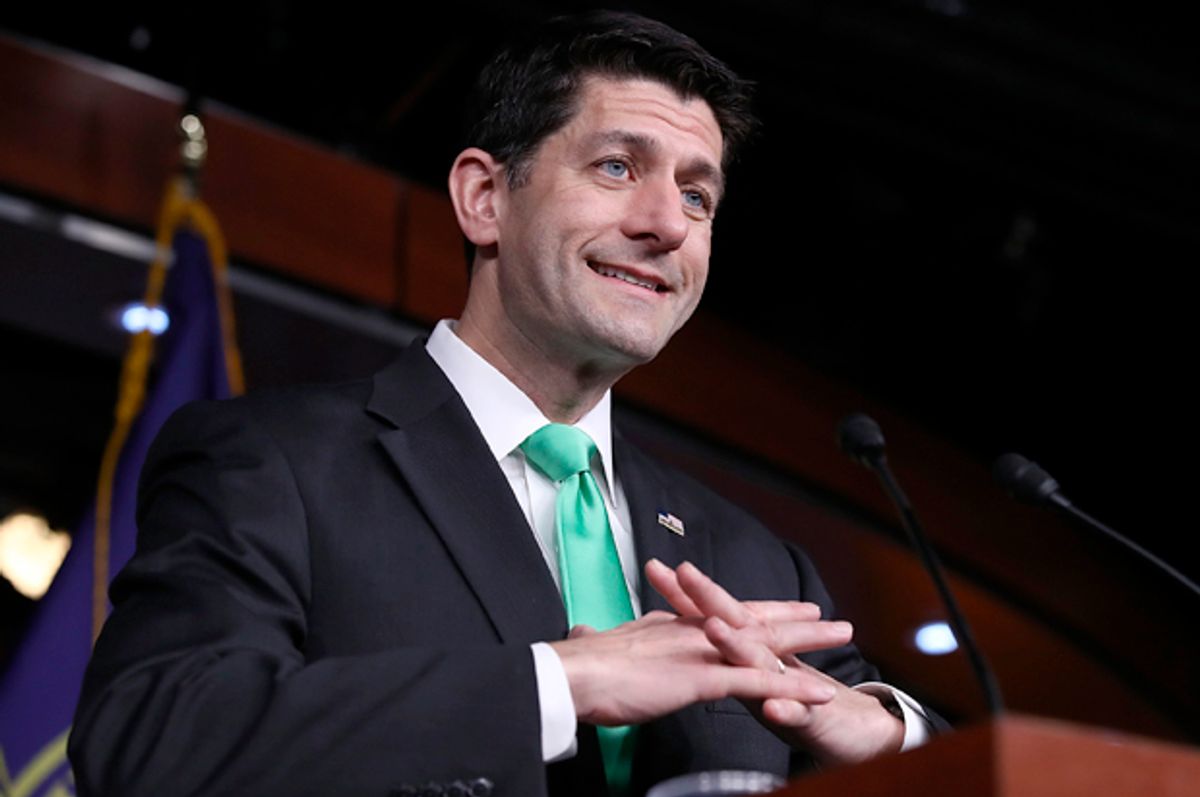I’ve written at length about how the American Health Care Act is a terrible piece of legislation. The Obamacare “replacement” cooked up by House Speaker Paul Ryan and endorsed by President Trump commits violence upon the health care system, would make care more expensive for the people who need the most help affording it and obliterate safety-net protections for low-income Americans. All of this is to be done in the service of cutting rich people’s taxes.
The politics swirling around the policy are no better, with hard-line conservatives and more moderate Republicans balking at the AHCA either for going too far or not far enough in dismantling the Affordable Care Act. To get around these political hurdles, Paul Ryan and the rest of the leadership team have agreed to a series of last-second changes to the AHCA, which is set to be voted on by the House on Thursday.
As Politico has reported:
House Republican leaders are making a last-ditch attempt to win enough support to pass their Obamacare repeal, revealing an expansive series of changes to the bill on Monday night designed to woo wary GOP lawmakers.
Requested by President Donald Trump, the amendment includes perks for restive conservatives who wanted optional work requirements and block granting in Medicaid, as well as a potential olive branch to wary centrists who demanded more help for older Americans to buy insurance.
More than anything else, these changes make clear that the AHCA fight is a cynical and destructive political exercise whose primary mission is to save Paul Ryan’s reputation.
Let’s start with the additional “help” for older Americans. This “help” would come via an $85 billion reserve fund to help people ages 50 to 64 receive tax credits for buying insurance. But, as Politico noted, the “amendment would not set up the tax credits but would instruct the Senate to do so.” As Matt Yglesias put it, this is the old “magic asterisk” trick.
The magic asterisk is a deceptive tactic that Ryan has previously used to make the impossible mathematics of his budget documents seem plausible. The way it works is that a policymaker, when confronted with a seemingly irresolvable budgetary problem, simply makes a notation indicating that the problem will be somehow fixed in the future. Then the person takes credit for having fixed the problem — like magic!
The AHCA’s “magic asterisk” is basically a pinky swear that the legislation will not leave older Americans destitute and bereft of health care. The Congressional Budget Office found that the AHCA would cause the cost of premiums for older people purchased on the individual market to explode — pricing them out of the insurance market altogether. The amendment would “fix” that problem by specifying that money should be set aside and instructing the Senate to do something with it.
While the amendment pretends to do something to help older people, it piles still more hardship on low-income people in a bid to secure more conservative support. The AHCA as initially drafted would gouge out $880 billion in Medicaid funding over a decade. The new legislation would allow states to impose a work requirement as part of Medicaid eligibility and, as Politico wrote, “give states the option of converting their Medicaid programs into block grants.” Both of these changes would cut costs while closing off benefits to people who need them.
Then there’s the special deal carved out for Republicans from upstate New York, who requested and obtained a provision that changes the way Medicaid costs are dispersed within that state. (New York is overwhelmingly Democratic in the densely populated downstate regions near New York City yet overwhelmingly Republican in rural upstate areas.) Democrats are howling, arguing that such a modification (in conjunction with other AHCA provisions) would force the state to cut Medicaid spending. But the drafting of this proposal has accomplished its primary goal of securing more political support for the bill. As Rep. Chris Collins told the New York Times, he and the rest of the New York Republican delegation went to the House leadership and said, “Yeah, you get this in there, you’ve got our votes.”
If you view the American Health Care Act as a vehicle for reforming the health care system, then these changes are massive failures in terms of improving the legislation. Older people would still be screwed on premiums, Medicaid would have more flesh carved off it, and millions of people would still be poised to lose their health coverage. The last-minute additions do, however, help the bill’s chances of clearing the likely House vote later this week.
It’s hard to look at all this and conclude that the AHCA is about anything more than checking the “repeal and replace” box that Republicans campaigned on, no matter what the human damage may be. President Trump himself pretty clearly sees it that way: He talks about the health care bill as a hurdle to be cleared before getting to tax reform, and his message to wary Republicans in Congress is rooted entirely in politics. “I honestly think many of you will lose your seats in 2018 if you don't get this done,” Trump reportedly told House Republicans on Tuesday, warning that a failure to pass the AHCA will mean smaller crowds at campaign rallies.
So it's not about health care. If this catastrophe makes one thing clear, it's that Republicans don't care about American health care, except as a political weapon. That’s why bad changes are being crudely soldered onto an already bad bill. That’s why the legislation is being hastily and quietly rewritten two days before a scheduled vote. And that’s why Paul Ryan is working feverishly to jam this awful legislation through as quickly as he can.



Shares